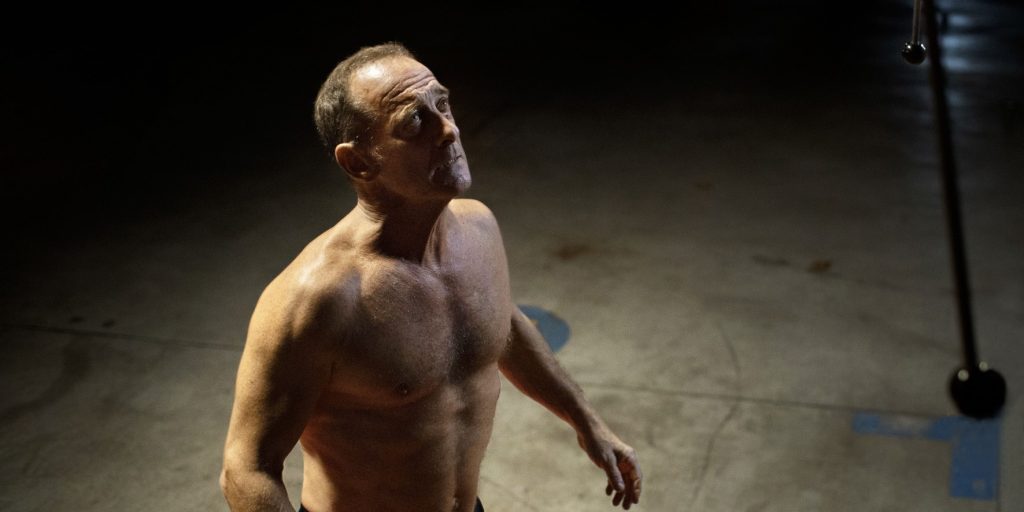Below is my review of this year’s Palme d’Or-winning film Titane – the sophomore feature from one of the most exciting directors in the infancy of her career, Julia Ducournau. It is impossible to review this film without spoiling it, so if you want to go in blind then it’s probably best to stop here.
In 2017 Ducournau directed her first feature-length film Raw, a coming-of-age story about a vegetarian veterinarian student named Justine who acquires a taste for human flesh. Many films that came before used horror to speak allegorically about something (Ginger Snaps is my favourite example) but what Raw managed to do was illustrate the confusion and wonder we all face in exploring our innate desires, as well as the shame we can be made to feel (particularly if such desires are not accepted by society.) If Raw is considered a bit risqué in its subject matter then Titane is downright monstrous…and one of the most deceptively emotional films I’ve seen.
Like Raw, the opening scene of Titane features a car crash caused by a girl named Alexia. She sits in the backseat of her father’s Peugeot, bored and making ‘vroom vroom’ noises with her mouth to amuse herself. Her father seems annoyed, turning up the radio to drown her out and her increasingly destructive behaviour leads to the car swerving into a concrete slab, and her head into the window opposite her. Titane refers to the titanium plate that Alexia has inserted in her skull to make her whole again but it also speaks to the nature of her self-imposed exterior. As she leaves the hospital with her parents she embraces the car that did this to her and kisses the passenger window, a strange child to say the least.
When we meet Alexia as an adult (Agathe Rousselle, remarkably in her debut film role), she is a sometimes serial killer and semi-famous showgirl who dances at motor shows. After two minutes of gyrating and twerking in her neon fishnets and gold booty shorts on the bonnet of an ostentatious Cadillac, she signs some autographs and heads off to the showers. A coworker, Justine (Ducournau’s muse Garance Marillier) tries to chat her up in the communals but Alexia is more interested in her nipple piercings. As she later walks to her car on this seemingly uneventful night, someone shadows her.
It’s a creep whose selfie she forced a smile in earlier and he’s a stage five clinger, following Alexia to her car and telling her that he loves her. He’s not going to let her leave without getting a kiss, so she obliges and swiftly pulls an intimidatingly large hairpin from her updo and stabs it right into his ear. The things we have to do to get out of some shituations, am I right ladies? This John’s mouth oozes white, foamy liquid all over Alexia but it’s probably not the first time she’s had a disappointing limp male cover her in his man goo. It’s also not the first time she’s killed someone, as the news reports on TV mention the several men and women who’ve been slain over the past few months. What happens next should be glossed over in even the most revealing of reviews.
We witness what in any other film may be construed as a dream sequence (apart from perhaps Cronenberg’s Crash) but it’s glaringly real. A passionate tryst confirms Alexia’s sexuality, the consequences of which begin to reveal themselves the next day. From this moment on all disbelief must be suspended as an outrageous saga about not-so-immaculate conception, identity fraud and attempts to find human connection is spun that renders its audience initially shocked, frequently uncomfortable and ultimately, moved.
The catalyst for movement is Vincent (Vincent Lindon), a roided-up, French Christopher Meloni not dissimilar in appearance to Frankenstein’s Monster. But there’s a definite sadness in his eyes and subtly downturned mouth that hint at the reason for his extreme exterior. Vincent wears thick performance-enhanced armour because he’s experienced the deepest hurt imaginable – his son Adrien went missing at the age of 7 and was never found. Coincidence will soon see his anguish finally answered as what was once lost is replaced with something quite different.

If exception should be made for calling someone “Daddy”, it’s here
The revving of Alexia’s pregnancy gets louder and louder as her belly starts to rapidly swell and substances that shouldn’t be coming out of a human seep from her breasts and more southern regions. That’s where most of the body horror lies in this film but nothing is particularly graphic. Ducournau allows the looming threat of what will no doubt be a complicated childbirth to weigh both on Alexia’s mind and on ours. The most classically feminine of functions is the thing that puts her in the most danger of being caught; something must be done. After committing the last murder as the Alexia we’ve been getting to know, she goes into hiding/an airport bathroom until she exits as a completely different person.
The film plays with music in ways that emphasise Alexia’s impending transformation, Ducournau having written a lot of the songs into the script before chasing the rights. Alexia’s theme, “The Wayfaring Stranger” highlights her involuntarily solo path to this point. A jaunty Italian tune from the 60s hints at the comedic side of a random bout of ultraviolence in the middle. The Zombies’ “She’s Not There” signals the abandonment of Alexia’s former self and acceptance into a small tribe of two. But as Alexia grows as a person, so too does her pregnant belly.
Ducournau’s fascination with metamorphosis and mutation is even more evident in this film than her first, both physically and metaphorically. Alexia’s physical transformation makes Amy Dunne’s glow down in Gone Girl seem pitiful; breaking her nose, taping her breasts and pregnant belly and shaving her head to look like the aged-up drawing of Vincent’s missing son. She passes as gender neutral at least or a sickly young man at most and refuses to talk, adding to the believability that “Adrien” has been through some trauma in the last ten years. Despite what should be obvious, Vincent willingly takes the bait and claims her, so broken that even this entirely unconvincing imposter is better than the perpetual unknown.
What Titane turns into once the murder is over, and the stronger-stomached viewers have marginally loosened their grip on the chair arms, is nothing short of a love story. There is a lifting of the veil in regards to Vincent and who he actually is beneath his vascular appearance. A firefighter by trade, he exists almost exclusively in a hypermasculine world and yet has very few of the gender insecurities expected of someone his age and testosterone level. Neon pink lights illuminate all-male dance raves in the fire station. He kisses “Adrien” on the face frequently, like he’s scared he’ll go away again. He calls him “sweetie” and rejoices when he catches him trying on a floral yellow maxi dress as it’s the same one Adrien used to steal from his mother and wear as a child. It’s fair to assume that Vincent never genuinely believes Alexia is Adrien but it doesn’t seem to matter – theirs is a bond of mutual healing and he needs someone just as much as she does.
There’s tragedy in Alexia’s arc as this mad situation sees her make more progress in the short time she spends as Vincent’s ‘son’ than she has in the last three decades. His misplaced unconditional love provides the nurture that was so clearly absent in her childhood and we get to witness her learning, like some alien being unfamiliar with the most basic of social mores. There are echoes of Under the Skin’s Laura, who begins to yearn for things we take for granted after observing us at closer proximity. But the closer Alexia gets to becoming human, the further her body slips from the facade. It becomes harder and more painful to bind her chest and stomach as she approaches full term and harder to keep this secret from the one person worth connecting with.
When asked about the repetition of names in her films (Justine, Alexia, Adrien) Ducournau gave a very interesting answer – rather than evidence of a lack of imagination, they are a mutation of the same character and she sees her films as “part of a continuity….or the same gesture.” Raw’s Alexia (Justine’s older sister) is too far gone with her murderous misbehaviour and ends up in a cell at the end of the film. Ducournau spoke of wanting to take Alexia out of that cell and put her in another world to see if she could “find her humanity” and with Titane I feel this goal is achieved with enormous success.
There is no denying that Titane is at times extreme; I’d expect nothing less from the woman who had her last protagonist wake up to a dead conquest with a missing leg and wonder if it was herself or her sister who ate it. But there’s a subtle sweetness at the heart of the film, like an onion (or ogre) whose sharp outer layers must be pulled away piece by pungent piece. I cannot wait to see what Julia Ducournau does next but I trust that it’ll be quite unlike anything else. 9/10
Titane is out November 25.


